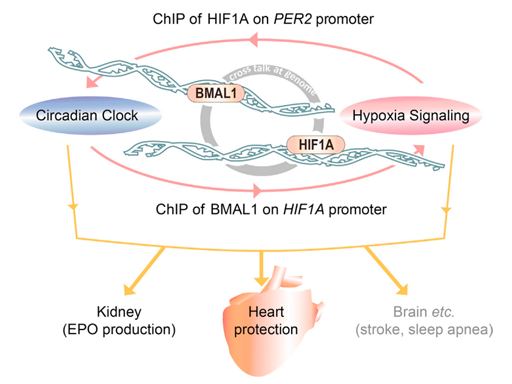Reciprocal Regulation between the Circadian Clock and Hypoxia Signaling at the Genome Level in Mammals
Yaling Wu, Dingbin Tang, Na Liu, Wei Xiong, Huanwei Huang, Yang Li, Zhixiong Ma, Haijiao Zhao, Peihao Chen, Xiangbing Qi, and Eric Erquan Zhang*
Circadian regulation is critically important in maintaining metabolic and physiological homeostasis.However, little is known about the possible influenceof the clock on physiological abnormalities occurringunder pathological conditions. Here, we report thediscovery that hypoxia, a condition that causes catastrophic bodily damage, is gated by the circadianclock in vivo. Hypoxia signals conversely regulatethe clock by slowing the circadian cycle and dampening the amplitude of oscillations in a dose-dependent manner. ChIP-seq analyses of hypoxia-inducible factor HIF1A and the core clock componentBMAL1 revealed crosstalk between hypoxia andthe clock at the genome level. Further, severe consequences caused by acute hypoxia, such as thosethat occur with heart attacks, were correlated withdefects in circadian rhythms. We propose that theclock plays functions in fine-tuning hypoxic responses under pathophysiological conditions. Weargue that the clock can, and likely should, be exploited therapeutically to reduce the severity of fatalhypoxia-related diseases.

https://dx.doi.org/10.1016/j.cmet.2016.09.009
